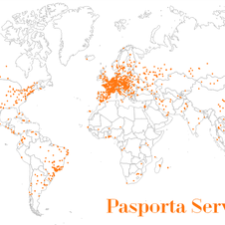Today Lingoblog celebrates English Language Day with this post by Claire French.
In the lead-up to English Language Day this year, I have been thinking through the privileges and challenges of existing in the world, and in new languages, as a ‘first language’ English speaker.
The concept of ‘first language’ is of course a troublesome notion because of how it suggests that I speak the language more ‘correctly,’ or hold further ‘fluency’ than those speaking it as a second language, which sociolinguists know to be unqualified and ideological. Yet, it is not my hold over the language that is most noticeable to the multi-bilingual/global majority when they first come into contact with me, but the sound of my variety.
As an Irish Australian who has lived half a life in Europe, with a significant portion of this being an education in England, I speak with high sociolinguistic variation. One would think that given this variation; I would be placed into an othering and white category, which is sometimes the case for those who know me well; however, it is not the most common verbal feedback I receive.

Most commonly, from the global majority, I receive comments about how I speak with ‘such correct’ or even ‘beautiful’ (!) English and almost just as often, I hear deferring statements of how this English makes them feel uncomfortable speaking English with me. At the simplest level, my high variation Australian-Anglo-Saxon-Celtic variety (with some Germanic and South African influences) indexes prestige with non-first language English speakers, to be potentially (and ideologically) counted as a higher order Global English. This means that my variety, – my voice in English – is hegemonic. It can be an imposition to some, and dominate others.
I live in Denmark and living in countries where I only have a basic handle on the lingua franca has become a hallmark of my life. I lived in Germany and learnt the language while there, coming to a point where I could interact with German resources daily, but never really knew myself in these. I’ve also been working in South Africa for over a decade, picking up basic understandings of Afrikaans, isiZulu and isiXhosa based on projects and collaborations. It seems that as someone interested in cultures and languages, I have built a practice of passive language learning, where I know enough of languages to have less potential for dominance. I am a sort-of-passive-multilingual.
I ask myself, on English Language Day, how does a first language English speaker move beyond such passivity? Why would I go from such status to such invisibility?
Many manage to because, in some way, their future depends on learning the language. This is not always the case for first language English speakers.
There is a large body of evidence in multi/bi/poly-lingual discourses of language learning for motivating factors towards making the switch in relationships at the workplace, public domains and in the home. Since I translanguage in the classroom, support Danish people to code-switch in Danish and English with me, attend events in Danish, consume media in Danish; the answer to my challenges will probably just be:
Time.
But this doesn’t mean I am apathetic. The potential dominance of my voice is a major problem and one that I am responsible for finding answers to. Even though I have been trying to chip away at these concerns as a researcher, I am also a subject of this research in my everyday life. Us first language English speakers must work harder to be less comfortable by inviting spaces of not-knowing, translanguaging, and English omission. This is because, in whatever way we speak to the global majority, we are an imposition.
Illustrations: Colourbox.dk.
Claire French is a researcher and performance maker who develops dramaturgies and methodologies for multilingual performance with minoritized languages. She is currently a Marie Skłodowska-Curie Actions Fellow in Dramaturgy at Aarhus University for the research project ‘Dramaturgies for Languaging’, where she is forming a multilingual theatre research network between language and performance scholars interested in language ideologies.







